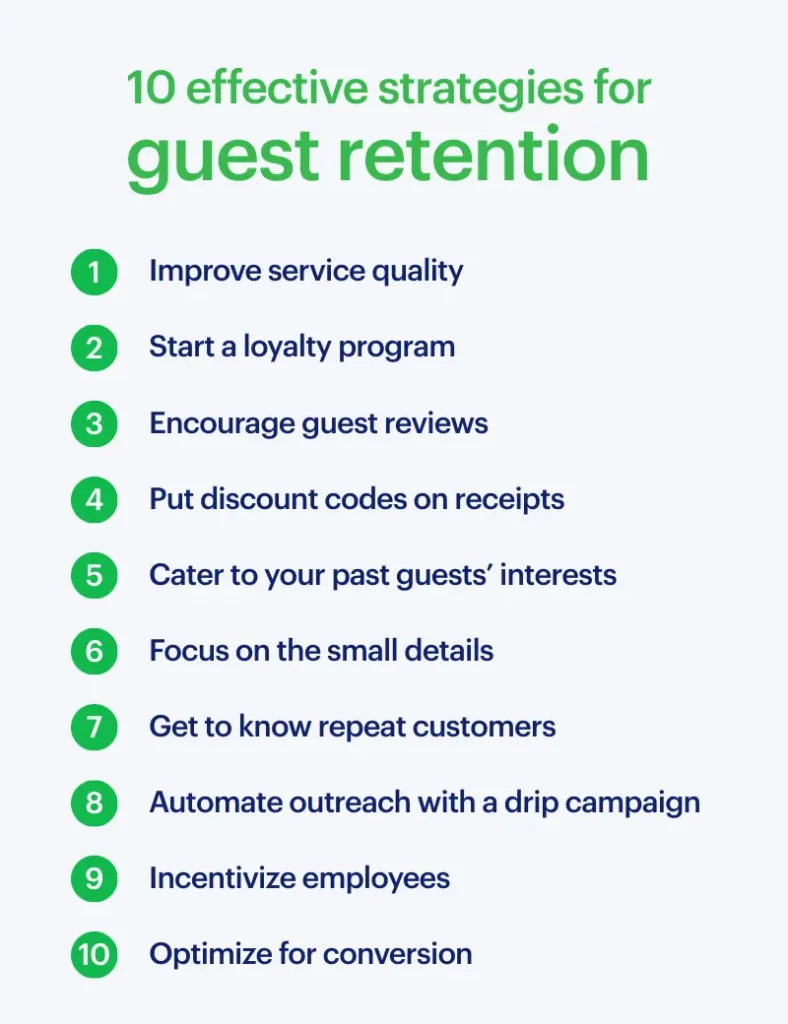10 Proven Guest Retention Strategies for Hospitality

Getting guests through your front door is hard enough. Getting them to come back is where the even greater challenge (and opportunity) lies.
In hospitality, guest retention requires building systems that consistently deliver great experiences — no matter who’s on shift, how busy you are, or how a guest heard about you.
Every part of your operation plays a role in whether someone returns. In this guide, we’re breaking down 10 proven ways to improve guest retention through smarter service, better tools, and a more motivated team.
The business value of guest retention
First, let’s establish why guest retention is something worth focusing on.
The obvious answer would be that repeat customers pay for another visit (or several) to your hotel or restaurant. But there’s more to it than that.
Here are some additional benefits of guest retention to consider:
- Repeat guests spend more.
- A report by BIA/Kelsey showed that on average, returning guests spend an average of 67% more than first-time visitors.
- Positive word of mouth.
- Loyal guests are more likely to leave glowing reviews and recommend your property to others.
- Lower acquisition costs.
- Retaining existing guests costs significantly less than constantly acquiring new ones.
One of the biggest reasons why guests return to a business is because of the emotional connection they’ve formed not just with the property, but with the people who made their experience memorable.
And that emotional connection starts with happy employees.
How to improve guest retention: 10 effective strategies
Whether you’re managing a hotel, restaurant, spa, or shuttle service, implementing the right strategies can turn a one-time visitor into a loyal regular.
Here are 10 proven guest retention strategies that can help you boost repeat visits, increase revenue, and build long-term loyalty:

1. Improve service quality
This might be a no-brainer, but it’s easier said than done. In today’s labor-constrained environment, consistency is a real challenge. High turnover, understaffing, and burnout can lead to wildly different guest experiences from one visit to the next.
Some ways to improve service quality across the board:
- Create a service playbook
- Standardize guest interactions (check-ins, dining experiences, complaint handling) with clear, repeatable steps.
- Standardize guest interactions (check-ins, dining experiences, complaint handling) with clear, repeatable steps.
- Use guest data wisely
- If a hotel guest prefers feather pillows or never wants housekeeping before 10am, save those preferences and auto-trigger them before their next stay.
- If a hotel guest prefers feather pillows or never wants housekeeping before 10am, save those preferences and auto-trigger them before their next stay.
- Use technology to fill service gaps
- Digital tipping, guest messaging platforms, and pre-arrival check-in forms can reduce the load on staff while still making guests feel cared for.
- Digital tipping, guest messaging platforms, and pre-arrival check-in forms can reduce the load on staff while still making guests feel cared for.
- Prioritize employee happiness
- Happy employees = happy guests. Help your staff feel appreciated with mobile tipping solutions, performance incentives, and flexible scheduling.
2. Start a loyalty program
Loyalty programs only work if they offer real value. Punch cards and generic points systems aren’t enough to make someone choose you over a competitor.
Design your program around three pillars:
- Relevance: Offer a reward that actually matters to your guests (free upgrades, priority reservations, exclusive experiences — not just 5% off).
- Ease of use: Guests should never have to ask how many points they’ve earned or how to redeem them.
- Visibility: Include points summaries or tier status in post-stay emails, receipts, and your mobile experience.
Example: A hotel could offer returning guests a choice between a free late checkout, a complimentary drink, or a $25 spa credit — this reinforces a sense of autonomy and personalization.
3. Encourage guest reviews
Don’t look at reviews as just a marketing tool — they’re also one of your most powerful retention levers.
Why? Because the way you respond shows guests (and prospective guests) how much you care.
- Respond to every review — not just the 5-star ones. Even a short “thank you” or “we’re sorry and here’s how we’re fixing it” can go a long way.
- Track and act on themes. If guests repeatedly mention slow check-ins or dirty floors, it’s not a fluke.
- Follow up personally if you resolved an issue. Let the guest know what changed — and invite them back to experience it.
Reviews give you a second chance to win someone over. Don’t waste that chance!
4. Put discount codes on customers’ receipts
A receipt offers one last touchpoint to engage your guest as they walk out the door.
Try adding:
- Time-sensitive offers (“Come back within 30 days for 15% off”)
- Booking prompts (“Rebook your next stay online with code RETURN10”)
- Loyalty program CTAs (“Earn double points if you rebook today”)
Whether printed, emailed, or texted, a smartly designed receipt is a low-cost, high-leverage tool for encouraging repeat business.
5. Cater to your past guests’ interests
Use data to personalize follow-up communication.
Does a past customer always order a muffin with their morning coffee? Offer a discount on their next pastry.
Did a hotel guest ask about the best Italian restaurants nearby? Let them know about the new spot that has opened since their last stay.
This kind of personal touch turns a past stay into a relationship — and makes your business feel like more than just a transaction.
6. Focus on the small details
Your guests might not realize it, but usually the biggest factor that influences their overall experience is a collection of small moments.
The handwritten thank you note on their bill, the breakfast basket delivered to their door in the morning, or the fun towel animals left by cleaning staff can have a bigger impact than you might expect. Those thoughtful details build emotional loyalty.
7. Get to know repeat customers
Make returning guests feel like VIPs. Remember their names, preferences, and favorite orders — and make sure your staff is briefed on those details before their next visit.
Simple ways to personalize return visits:
- Greet them by name at check-in
- Pre-load their preferences (room type, favorite drink, etc.)
- Send a “welcome back” email or text before their arrival
The more familiar the experience feels, the more likely they’ll keep coming back.

8. Automate outreach with a drip campaign
A drip campaign is a series of automated messages (usually via email or SMS) that you send based on a guest’s behavior — like booking a stay, checking out, or making a purchase.
Use an automated drip campaign to:
- Say thank you
- Offer personalized recommendations
- Remind them to rebook
- Share new promotions or events
Drip campaigns keep you top-of-mind without requiring tons of manual work.
9. Incentivize employees
Your employees are the face of your business and the single most important factor in the guest experience. When they’re engaged, motivated, and happy, it shows.
Give them a reason to care about the service they provide by offering:
- Bonuses tied to guest reviews or satisfaction scores
- Recognition programs like “Employee of the Month”
- Rewards for hitting team goals or upselling services
Incentivized employees take more pride in their work — and that directly improves guest retention outcomes.
10. Optimize for conversion
Make it easy for guests to return. A clunky rebooking process or confusing online ordering system can break the cycle of loyalty before it starts.
- Can guests rebook or reorder in just a few clicks?
- Are you capturing guest contact info to follow up after their visit?
- Are you including calls-to-action in your receipts, emails, or physical signage?
The easier you make it for guests to do business with you, the more likely they’ll be to do so.
How employee satisfaction drives guest experiences
We’ve established that guest retention is worth striving for, and we’ve covered several guest retention strategies you can implement.
But the bottom line is that very few methods will prove as effective in retaining guests as maximizing employee satisfaction.
Let’s take a closer look at how employee satisfaction contributes to positive guest experiences:
Happy employees provide better service
Employees who feel valued are naturally more engaged.
Conversely, employees who feel unvalued are more likely to be cautious, guarded, and even cynical.
Happy employees are more likely to go beyond the basics, putting extra enthusiasm into their work, resulting in personalized and thoughtful interactions with guests. We all want to be made to feel special, and it’s not something we typically forget. That’s why when employees make these efforts with guests, they’re not in vain — guests will cherish those memories for a long time to come.

Happiness at work typically leads to staff displaying:
- Genuine friendliness: Guests can tell the difference between forced smiles and authentic warmth.
- Attentiveness: Happy staff are more present and proactive in anticipating guest needs.
- Problem solving skills: Motivated employees are more likely to take initiative when resolving issues, turning potential complaints into positive experiences.
In addition, happy employees often display a higher level of emotional intelligence. They’re better at reading social cues, responding to guests’ unspoken needs, and defusing tense situations with empathy. This emotional connection is what takes good service up a notch to exceptional service.
Reduced turnover improves consistency
We also need to consider the indirect consequences of staff feeling happier and more satisfied in their work. Happy team members are less likely to leave their role, so we can deduce that keeping your team happy will reduce turnover.
So how does reducing turnover affect guests?
Most importantly, high staff turnover disrupts service quality. New hires take time to train, and guests notice when service feels inconsistent.
In contrast, a stable and satisfied team offers:
- Familiar faces: Repeat guests appreciate seeing the same friendly staff, building a sense of comfort and trust.
- Consistent quality: Experienced employees understand the property’s standards and deliver reliable service.
Consistency also contributes to operational efficiency. Long-term employees are more familiar with internal processes, which reduces errors and improves the speed of service.
Employee well-being reflects in guest feedback
Unhappy employees can’t hide their dissatisfaction. Guests are quick to pick up on negative energy, which can lead to poor reviews. On the flip side, positive employee morale often translates into glowing feedback. When staff feel cared for, they naturally pass that care onto guests.
Guests are more likely to leave positive reviews when they’ve experienced warm, genuine hospitality.
Online reputation plays a crucial role in attracting new business, and employee satisfaction is the hidden force behind many five-star reviews.
Policies & practices to increase employee satisfaction
We’ve explored how employee happiness translates into guest retention, but how do you boost employee satisfaction?
What it takes to boost employee satisfaction will differ from one business to the next, but one thing is certain: employee happiness doesn’t happen by chance. It requires intentional policies and daily practices that create a supportive work environment and an employee-centric culture.
Here are some ways your business can achieve this:
Ensure fair compensation and transparent tipping practices
One of the quickest ways to improve employee morale is through fair, timely pay.
This includes:
- Transparent tipping systems
- Staff should know exactly how tips are distributed, reducing mistrust and confusion.
- Timely payouts
- Waiting weeks for tips can be discouraging. Digital tipping solutions like eTip ensure staff receive their earnings promptly.
Provide opportunities for growth and development
Investing in your employees’ futures shows that you value them beyond their current role.
Consider:
- Training programs
- Skill-building workshops keep staff engaged and motivated.
- Clear career pathways
- Employees are more likely to stay if they see opportunities for advancement.
Providing mentorship programs or leadership development tracks can also inspire employees to envision a long-term future with the company. This investment in growth fosters loyalty and a deeper commitment to the organization’s success.
Offer flexible scheduling for work-life balance
As you know, hospitality can be extremely demanding, with long hours and unpredictable shifts wearing staff down over time. Offering flexibility can help employees to better manage their workload, while also demonstrating respect for employees’ personal lives.
Consider offering:
- Flexible shifts
- Accommodate requests when possible, especially for parents or students.
- Mental health days
- Encourage staff to take time off when needed without stigma.
When employees feel they can manage their personal and professional responsibilities, they’re more likely to bring positive energy to their roles.
Provide recognition and appreciation
Acknowledging hard work goes a long way. Simple gestures like “Employee of the Month” programs, shout-outs in meetings, or handwritten notes from management can boost morale.
Recognition doesn’t have to be formal. A culture of everyday appreciation — saying thank you, celebrating small wins, and acknowledging individual contributions — creates an environment where employees feel seen and valued.
The role of technology in guest retention
While policies set the foundation, technology can make a big difference in daily operations. Digital tools not only streamline processes but also contribute directly to employee satisfaction.
Here are four technologies that can drive long-term guest loyalty at your business:
1. Digital tipping platforms
Happy, motivated employees are at the heart of guest satisfaction — and digital tipping helps make that possible. When staff know they’ll receive tips quickly and fairly, they’re more likely to provide high-quality service that guests want to return for.
Digital tipping improves guest retention by:
- Enabling guests to leave a tip from their phone without cash
- Delivering instant or direct-to-payroll payouts to employees
- Providing transparency into how tips are earned and distributed
- Reducing the time managers spend on tip handling and disputes
Implement cashless tipping effortlessly by investing in digital tipping software like eTip.

2. Customer relationship management (CRM) systems
A CRM captures data like booking history, preferences, feedback, and loyalty status, allowing you to deliver consistent service whether someone visits once a week or once a year.
With a CRM, you can:
- Track guest behavior and visit frequency
- Automatically flag repeat customers for recognition or rewards
- Centralize communication preferences and notes across departments
- Tailor promotions or follow-ups to each guest
3. Marketing automation tools
With the right marketing tools, you can maintain the relationship long after the visit — and bring guests back with timely, relevant outreach.
Channels to focus on:
- Email marketing: Send drip campaigns, post-stay thank yous, birthday offers, and more.
- SMS marketing: Share flash promos or reminders that drive urgency.
- Paid ads & remarketing: Re-engage past guests across social media or Google when they’re browsing or booking again.
Automation is key here. Set up smart workflows once, and your system will keep nurturing guest loyalty in the background.
Guest retention isn’t luck — it’s operational excellence
Guest retention doesn’t happen by accident. It’s the result of thoughtfully implemented workflows, consistent service, and employees who feel supported enough to go above and beyond.
You can offer discounts, automate follow-ups, or run loyalty campaigns, but if your staff is burned out, your tech is clunky, or your service is inconsistent, guests won’t return.
Guest retention is a long game. But play it well, and it pays off.
Join the eTip community!
We'll send the latest content & special releases directly to your inbox.
Ready to join the community?
Receive the latest & greatest content from eTip, sent directly to your preferred inbox!

